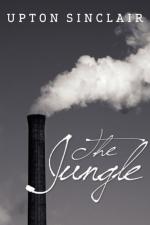|
This section contains 10,720 words (approx. 36 pages at 300 words per page) |

|
SOURCE: Homberger, Eric. “Upton Sinclair.” In American Writers and Radical Politics, 1900-39: Equivocal Commitments, pp. 34-58.New York: St. Martin's Press, 1986.
In the following essay, Homberger analyzes The Jungle as Sinclair's first novel after his conversion to socialism.
‘American literature today’, wrote Gertrude Atherton in 1904, ‘is the most timid, the most anaemic, the most lacking in individualities, the most bourgeois that any country has ever known.’1 A modestly successful and highly industrious lady scribbler, with over fifty books under her belt in a career which continued for a half-century from 1892, Mrs Atherton waved the banner of a high and serious art. She advised her contemporaries to abandon the snug and the conventional; writers must learn to ‘fight unceasingly’ for literature, and face the prospect of having ‘to stand absolutely alone’. Cynics, as is their wont, quickly pointed out how much easier it was for Mrs Atherton at forty-seven...
|
This section contains 10,720 words (approx. 36 pages at 300 words per page) |

|


